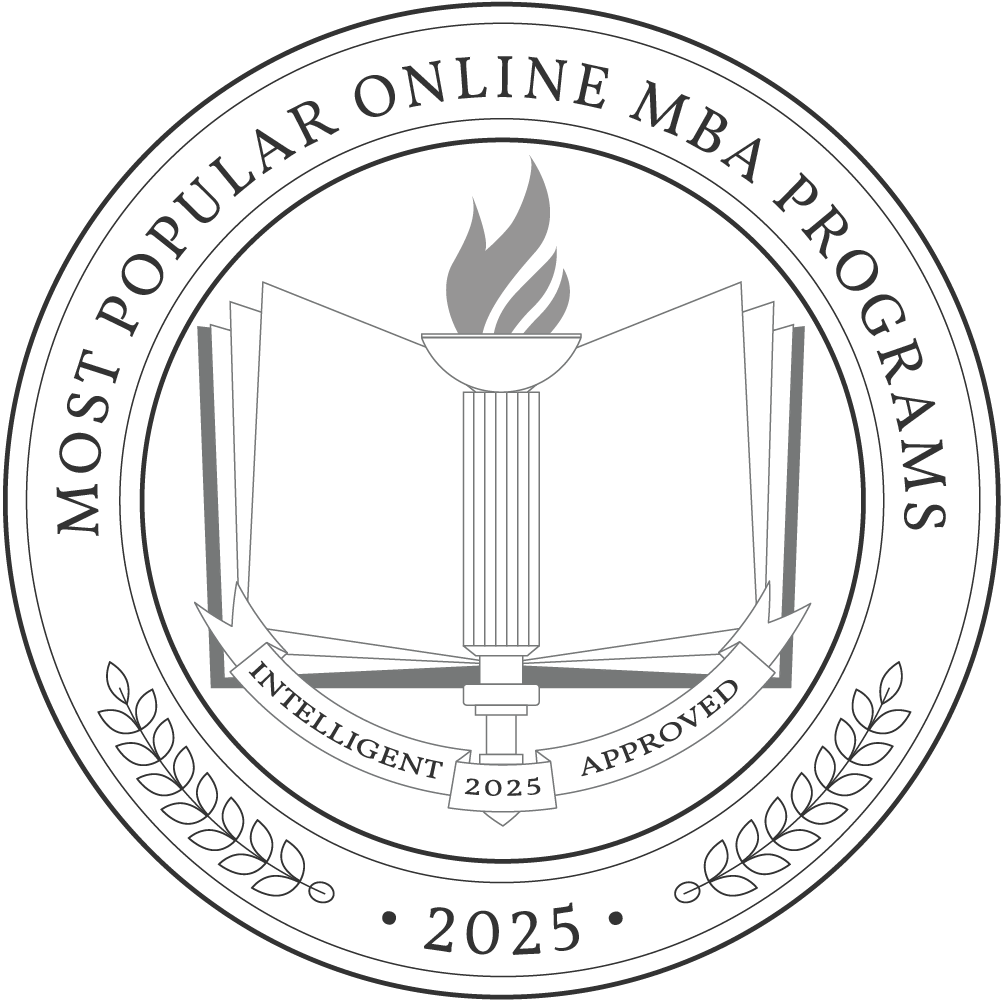If you’re looking to advance your career in business and gain a competitive edge, these online MBA programs offer a flexible and convenient way to achieve your goals. Taking as little as 18 months to two years to complete, online MBA programs are known for catering to working professionals seeking to balance their studies with their busy schedules. While costs may vary, the average tuition for a graduate degree program is $20,513 per year.
Graduates of these programs are well-prepared for various leadership roles — such as marketing manager, financial manager, and operations manager — with average annual salaries ranging from $103,840 to $156,580.
Why Trust Us
The Intelligent.com Higher Education Team is dedicated to providing students with independent, equitable school and program rankings and well-researched resources. Our expert-driven articles cover topics related to online colleges and programs, paying for school, and career outlooks. We use data from the U.S. Department of Education’s College Scorecard, the National Center for Education Statistics, and other reputable educational and professional organizations. Our academic advisory team reviews content and verifies accuracy throughout the year for the most current information. Partnerships do not influence rankings or editorial decisions.
- Analyzed over 2,000 national, accredited, and nonprofit colleges and universities
- 800+ rankings pages are reviewed and updated yearly
- Content is informed by reputable sources, surveys, and interviews with academic advisors and other experts
- Over 100 data points are reviewed for accuracy and quality throughout the year, including sources
How we rank schools
Our list features the best online Popular MBA degree programs at top colleges nationwide. Each school featured is a nonprofit, accredited institution — either public or private — with a high standard of academic quality for post-secondary institutions.
We evaluated each school’s program on tuition costs, admission, retention and graduation rates, faculty, reputation, and the student resources provided for online students. We collected data from trusted sources like the National Center for Education Statistics, individual school and program websites, school admissions counselors, and other data sources. Then, we calculated the Intelligent Score on a scale of 0 to 100 based on the following criterion:
Academic Quality:
- Admission rate versus enrollment rate
- Retention rate of students who return after year one
- Accreditation status (regional and programmatic)
- Nonprofit status, both private and public institutions
Graduation Rate
- Overall graduation rate
- Total number of currently enrolled students, including diversity metrics
- Student-to-faculty ratio
Cost and ROI
- In-state and out-of-state per-credit tuition rates and fees
- Required credits to graduate
- Earning potential after graduation
- Availability of federal student loans, scholarships, and other financial aid options
Student Resources
- Available student services for online-only and hybrid programs
- On-campus amenities like tutoring centers and the number of libraries
Read more about our ranking methodology.
The 50 Most Popular Online MBA Degree Programs
FiltersInstitution Type
Status
- Intelligent Score
- Alphabetically By University Name
- Acceptance Rate
- Enrollment
- In-state Graduate Tuition
- Out-of-state Graduate Tuition
- In-state Undergraduate Tuition
- Out-of-state Undergraduate Tuition

Franklin University
Intelligent Score: 99.14In-state: $9,552
Out-of-state: $9,552
In-state: $16,080
Out-of-state: $16,080
SAT: N/A
ACT: N/A
$670
Online
International Accreditation Council for Business Education
36

Indiana University - Bloomington
Intelligent Score: 99In-state: $9,815
Out-of-state: $36,194
In-state: $9,786
Out-of-state: $9,786
SAT: 1120-1350
ACT: 24-31
$1,686
Online
Association to Advance Collegiate Schools of Business
54

Carnegie Mellon University
Intelligent Score: 98.64In-state: $57,560
Out-of-state: $57,560
In-state: $46,441
Out-of-state: $46,441
SAT: 1460-1560
ACT: 33-35
$758
Online, On-Campus
Association to Advance Collegiate Schools of Business
48

University of North Carolina - Chapel Hill
Intelligent Score: 98.42In-state: $7,019
Out-of-state: $34,198
In-state: $10,552
Out-of-state: $10,552
SAT: 1280-1490
ACT: 28-33
$2,025
Online
Association to Advance Collegiate Schools of Business
62

Penn State World Campus
Intelligent Score: 98.17In-state: $15,025
Out-of-state: $24,413
In-state: $22,464
Out-of-state: $22,464
SAT: 1070-1300
ACT: 24-29
$1,248
Online
Association to Advance Collegiate Schools of Business
48

University of Michigan - Ann Arbor
Intelligent Score: 97.47In-state: $16,520
Out-of-state: $53,669
In-state: $24,344
Out-of-state: $24,344
SAT: 1340-1520
ACT: 31-34
Resident: $1,871
Non-Resident: $2,046
Online, On-Campus
Association to Advance Collegiate Schools of Business
57

Brenau University
Intelligent Score: 96.68In-state: $30,000
Out-of-state: $30,000
In-state: $13,356
Out-of-state: $13,356
SAT: 930-1160
ACT: 17-23
$824
Online
Accreditation Council for Business Schools and Programs
36

University of Southern California
Intelligent Score: 96.51In-state: $59,260
Out-of-state: $59,260
In-state: $47,880
Out-of-state: $47,880
SAT: 1340-1530
ACT: 30-34
$2,307
Online
Association to Advance Collegiate Schools of Business
51

Arizona State University
Intelligent Score: 95.68In-state: $10,710
Out-of-state: $28,800
In-state: $11,720
Out-of-state: $11,720
SAT: 1100-1320
ACT: 21-28
$565
Online
Association to Advance Collegiate Schools of Business
60

University of Florida - Warrington
Intelligent Score: 95.25In-state: $4,477
Out-of-state: $25,694
In-state: $10,770
Out-of-state: $10,770
SAT: 1290-1460
ACT: 29-33
$1,000 - $1,500
Online, On-Campus
Association to Advance Collegiate Schools of Business
32-48

Rice University
Intelligent Score: 94.91In-state: $50,310
Out-of-state: $50,310
In-state: $47,306
Out-of-state: $47,306
SAT: 1460-1570
ACT: 34-36
$2,130
Online
Association to Advance Collegiate Schools of Business
54

Oklahoma State University
Intelligent Score: 94.64In-state: $5,357
Out-of-state: $20,877
In-state: $5,531
Out-of-state: $5,531
SAT: 1020-1250
ACT: 21-28
Resident: $489
Non-Resident: $530
Online, On-Campus
Association to Advance Collegiate Schools of Business
33

Campbellsville University
Intelligent Score: 93.25In-state: $24,900
Out-of-state: $24,900
In-state: $8,473
Out-of-state: $8,473
SAT: N/A
ACT: N/A
$514
Online
International Accreditation Council for Business Education
36

University of Washington - Seattle
Intelligent Score: 91.77In-state: $10,629
Out-of-state: $37,998
In-state: $16,278
Out-of-state: $16,278
SAT: 1200-1453
ACT: 27-33
$1,500
Online, Hybrid
Association to Advance Collegiate Schools of Business
62

University of Texas at Dallas
Intelligent Score: 91.66In-state: $11,448
Out-of-state: $40,032
In-state: $12,028
Out-of-state: $12,028
SAT: 1210-1470
ACT: 26-33
$914
Online
Association to Advance Collegiate Schools of Business
53

Auburn University
Intelligent Score: 91.49In-state: $10,080
Out-of-state: $30,240
In-state: $10,080
Out-of-state: $10,080
SAT: 1160-1320
ACT: 25-31
$950
Online
Association to Advance Collegiate Schools of Business
39

University of Wisconsin
Intelligent Score: 91.03In-state: $9,273
Out-of-state: $37,161
In-state: $10,728
Out-of-state: $10,728
SAT: 1260-1460
ACT: 27-32
$825
Online
Association to Advance Collegiate Schools of Business
36

University of Illinois at Urbana-Champaign
Intelligent Score: 89.99In-state: $14,317
Out-of-state: $33,824
In-state: $15,016
Out-of-state: $15,016
SAT: 1200-1460
ACT: 27-33
$332
Online
Association to Advance Collegiate Schools of Business
72
How to Choose an Online MBA Program
Choose your area of study
While earning a general MBA is an excellent option for students wanting to remain open to a diverse range of career opportunities, those with an eye on a particular field may do well to pursue a concentration. To choose yours, carefully consider your career goals and evaluate which area of study will help you meet those objectives.
For instance, finance and accounting specializations suit people with strong analytical skills, while marketing and sales are ideal for creatives with outstanding communication abilities. Operations and supply chain management may appeal to those with a penchant for efficiency and process optimization. Also, a project management concentration will provide you with a versatile skill set that’s valuable across many different industries.
Research schools and programs
You should only apply to institutions that have been approved by a DOE-recognized regional accrediting organization, such as the New England Commission of Higher Education or Northwest Commission on Colleges and Universities. These organizations evaluate schools to ensure they provide students with a high-quality education. Those who attend a school that isn’t regionally accredited may be unable to access financial aid or transfer credits to another institution if needed.
Ideally, your online MBA program will also be accredited by a respected industry group like the Association for the Advancement of Collegiate Schools of Business (AACSB) or the Accreditation Council for Business Schools and Programs (ACBSP). These programmatic accrediting organizations have particularly high standards for business education.
Look into factors such as curriculum relevance, internship opportunities, and faculty reputation. It’s also important to consider the financial aspect of pursuing higher education. While there are many options to help you finance your degree, you’ll want to focus your research on programs within your budget.
To learn more about any schools that you’re interested in, you can visit the school’s website, contact an admissions counselor, follow the school on social media, or attend an in-person or virtual open house.
Prepare for tests and applications
Application requirements vary by school and program. If standardized tests like the GMAT or GRE are required, create a study plan, take practice exams, and consider enrolling in a prep course.
Undergraduate transcripts, letters of recommendation, and a personal statement are often required as well. By meticulously preparing for this crucial part of the admissions process, you can enhance your chances of admission to your dream MBA program.
Also, you should always contact an admissions counselor to ensure you have the most accurate information regarding requirements and deadlines.
Select your program
Before making your final decision, review your needs and goals again. Do you plan to attend school full-time or part-time? Do you want your program to be as online as possible, or are you fine with a hybrid program that has a fair amount of in-person requirements? Some programs offer asynchronous courses, which can be completed at your own pace, while others only offer synchronous courses, which involve remotely attending lectures and completing assignments at the same time as other students — which of these two online learning formats do you prefer? Your school should accommodate your scheduling needs and learning preferences.
Determine how you’ll pay for your degree
Speak to financial aid counselors at the schools you’re interested in for the most accurate and specific information about program cost. To figure out how you will fund your education, start by researching scholarships and grants specifically tailored to graduate students, which are often offered by universities, private organizations, and professional associations. Complete the Free Application for Federal Student Aid (FAFSA), as it will help you access federal student loans and potentially work-study programs. And those who already work in the field should see if their employer offers tuition assistance benefits as well.
What Can You Expect From an Online MBA Program?
Online MBA programs give aspiring business professionals a comprehensive education in business administration with the flexibility to study from anywhere. Students learn essential marketing, leadership, operations, and finance skills, enabling them to make strategic business decisions. These programs usually take 18 months to two years to complete, depending on the student’s pace and whether they enroll part-time or full-time.
Online MBA programs usually offer a blend of asynchronous and synchronous learning, leveraging virtual classrooms, video lectures, and interactive assignments. Additionally, students can participate in discussions and collaborate with peers from diverse professional backgrounds.
While most programs are entirely online, some may require in-person workshops or residencies, usually lasting a few days to a week. These on-campus components facilitate networking, team-building exercises, and face-to-face interactions with faculty and fellow students, enhancing the learning experience.
Potential courses you’ll take in an online MBA program
- Operations Management: Frequently a core requirement, courses centered on operations management focus on managing business procedures, supply chains, and quality control. Students learn to optimize operations, reduce costs, and enhance productivity to achieve organizational efficiency.
- Entrepreneurship and Innovation: This course explores the principles of entrepreneurship, covering topics such as opportunity recognition, business planning, and financing options. Students gain expertise in innovation, developing business models, and creating sustainable ventures.
- Financial Management: Another standard requirement in most curricula, this course equips students with the knowledge and skills to analyze financial statements, evaluate investment opportunities, and make informed decisions about financing, risk management, and capital budgeting.
- Business Ethics: While some programs consider this course an elective, many others include it as a segment of their core curriculum. This course teaches students how to examine ethical dilemmas in business and make responsible decisions considering the impact on stakeholders and society. They explore corporate social responsibility initiatives and sustainability practices in modern business settings.
What Can You Do With an Online MBA Degree?
Career outlook
Many career paths are open to MBA graduates, although your interests and skills will determine your direction. Many MBA students choose to specialize in a particular field, such as finance or healthcare administration, to pursue a position in an area that appeals to them.
An MBA equips you for leadership-level positions across business and industry. You may also utilize your degree in the classroom at the secondary or higher education level or in the nonprofit world.
Here are some possible career paths you might embark on with an online MBA degree:
- Top executive — Coordinate the work of an organization by establishing goals, overseeing activities, and appointing department heads and managers.
- Median annual salary: $103,840
- Projected employment growth (through 2032): 3%
- New job openings projected: 311,600 annually
- Management analyst — Advise organizations on how to increase revenue, reduce expenses, and improve efficiency.
- Median annual salary: $99,410
- Projected employment growth (through 2032): 10%
- New job openings projected: 92,900 annually
- Financial manager — Maintain the financial health of an organization by directing investment activities and developing plans for meeting long-term financial goals.
- Median annual salary: $156,100
- Projected employment growth (through 2032): 16%
- New job openings projected: 69,600 annually
Online MBA Degree Frequently Asked Questions
How do I apply to an online MBA degree program?
The application process for most online MBA programs is relatively straightforward. While admissions requirements vary, most institutions require applicants to submit their academic transcripts, a resume, letters of recommendation, and a statement of purpose. Some programs may require standardized test scores like the GMAT or GRE, while others offer waivers based on work experience or academic achievements.
Communicating with an admissions counselor is crucial to clarify doubts and ensure you meet all requirements. They can guide you through the application process, help with document submission, and provide valuable insights to enhance your chances of admission.
How much does an online MBA degree cost?
The average annual tuition for a graduate degree is $20,513. However, this figure can vary significantly depending on your chosen institution and program. Private schools are generally more expensive than public schools, though public schools tend to charge out-of-state students a much higher tuition rate than in-state students.
It’s also important to consider additional expenses like textbooks, technology requirements, and potential travel costs for workshops or other in-person activities in hybrid programs.
How long does it take to earn an online MBA degree?
Most full-time students take 18 months to two years to graduate with their MBA. Those who enroll part-time may extend the timeframe to three years or more. However, many students find that studying part-time enables them to balance work and personal commitments while earning their degree.
Likewise, each program’s length will vary depending on its credit requirements, with most online MBA programs ranging from 36 to 54 credits. Generally, the more required credits, the longer it will take to complete.
Is an online MBA degree worth it?
An online MBA degree program can be worth it if it aligns with your interests and professional aspirations. This degree provides a solid grounding in business principles and can position you for leadership positions in various fields and business sectors.
Earning your MBA provides excellent networking opportunities with peers, faculty, and alumni. They and your institution’s career services office can help you gain a position that suits you and offers a competitive salary. Management positions have a median annual income of $116,880, which is the highest of any major occupational group.
For those interested in entrepreneurship, an MBA will give you the foundational skills needed to launch, market, and succeed with a business. Many MBA programs offer access to resources such as business incubators and consulting opportunities that can support early-stage startups.
Earning your MBA online can be an efficient way to gain a graduate credential. The flexibility of asynchronous classes, which can be taken whenever it is convenient for the student, makes it an excellent choice for adult learners with other personal or professional commitments.

